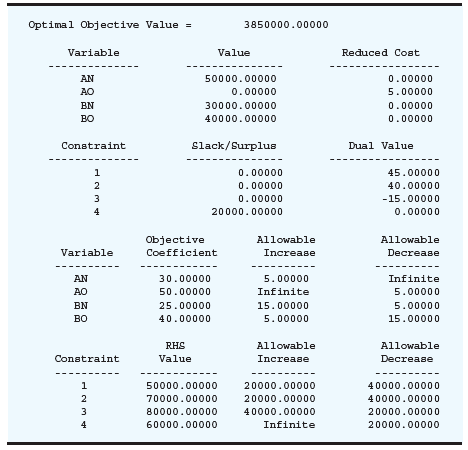Davison Electronics manufactures two models of LCD televisions, identified as model A and model B. Each model
Question:

Let
AN = Units of model A produced on the new production line
AO = Units of model A produced on the old production line
BN = Units of model B produced on the new production line
BO = Units of model B produced on the old production line
Davison€™s objective is to determine the minimum cost production plan. The computer solution is shown in Figure 3.21.
a. Formulate the linear programming model for this problem using the following four constraints:
Constraint 1: Minimum production for model A
Constraint 2: Minimum production for model B
Constraint 3: Capacity of the new production line
Constraint 4: Capacity of the old production line
b. Using computer solution in Figure 3.21, what is the optimal solution, and what is the total production cost associated with this solution?
c. Which constraints are binding? Explain.

d. The production manager noted that the only constraint with a positive dual value is the constraint on the capacity of the new production line. The manager€™s interpretation of the dual value was that a one-unit increase in the right-hand side of this constraint would actually increase the total production cost by $15 per unit. Do you agree with this interpretation? Would an increase in capacity for the new production line be desirable? Explain.
e. Would you recommend increasing the capacity of the old production line? Explain.
f. The production cost for model A on the old production line is $50 per unit. How much would this cost have to change to make it worthwhile to produce model A on the old production line? Explain.
g. Suppose that the minimum production requirement for model B is reduced from 70,000 units to 60,000 units. What effect would this change have on the total production cost? Explain.
Step by Step Answer:

An Introduction to Management Science Quantitative Approach to Decision Making
ISBN: 978-1337406529
15th edition
Authors: David R. Anderson, Dennis J. Sweeney, Thomas A. Williams, Jeffrey D. Camm, James J. Cochran





